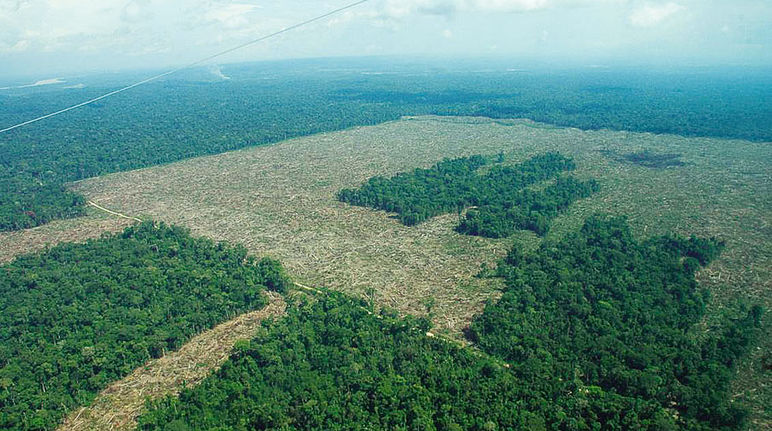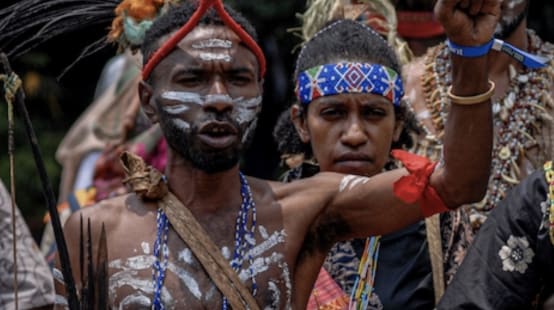Rainforest destruction imported duty-free
 EU free trade threatens rainforests
EU free trade threatens rainforests
On December 11, the European Parliament will vote on a free trade agreement between the EU, Colombia and Peru. 148 conflicts with commodities companies are ongoing in Peru alone, yet human rights and environmental concerns remain sidelined. Please call on members of the Parliament to vote against this trade agreement.
Call to actionConflicts between local residents and mining companies over land and water in Peru and Colombia have worsened steadily in recent years. In August 2012, 148 environmental conflicts that cost 16 human lives were listed in Peru. The situation is even worse in Colombia. Transnational corporations are destroying the environment while maintaining documented connections to paramilitary organizations that silence critical voices. 34 trade unionists were killed in 2012 alone.
The situation threatens to escalate further with the adoption of a free trade agreement between the EU, Colombia and Peru. Binding environmental and human rights standards were removed from the agreement under pressure from the industry – despite the fact that the EU itself has noted in a report that without such standards, the free trade agreement would endanger water quality and biodiversity in both countries and promote the destruction of fragile ecosystems. Even in prior trade agreements with Colombia and Peru, these standards were more pronounced.
In addition to mining and oil drilling, palm oil plays an important role in the agreement – it is slated for duty-free import in order to satisfy Europe’s hunger for cheap vegetable oil. This is an incentive to expand the plantations in both countries. In Colombia, oil palm plantations already cover 360,000 hectares. The palm oil boom has spared Peru so far. Yet plans have been drawn up that mark over 4.3 million hectares of rainforest territory as suitable for oil palm plantations. Pilot projects are already showing the devastating effects of monocultures on the people and environment in Peru.
Please urge EU parliamentarians to reject the free trade agreement for social and environmental reasons.
BackgroundThomas Fritz analyzed the free trade agreement and summarized his conclusions in a Rainforest Rescue interview: “The dramatic aspect of this development is that human rights and environmental standards are weaker in the new free trade agreement than in the previous agreement with Colombia and Peru.Vital human rights, such as the right to food and the right to land, are missing from the agreement. And that, of course, is a very negative development.”
Sources:
Study by Thomas Fritz on the impact of the free trade agreement
EU social and environmental assessment of the free trade agreement
To: The Members of the European Parliament
Honorable Members of the European Parliament,
A free trade agreement between the EU and Peru and Colombia will be submitted to the European Parliament for ratification in December. The undersigned organizations have reason to worry that this agreement will exacerbate social and environmental conflicts in Peru and Colombia, as it would promote the unbridled exploitation of natural resources in those countries.
The agreement does not contain binding terms for the observance of human rights and thus will do nothing to counter the human rights violations that have been noted in Peru and Colombia. It also lacks binding environmental standards to ensure that continued resource extraction does not destroy the livelihoods of local people affected by mining. The ecologically irresponsible spread of industrial-scale oil palm plantations in the Amazon region also plays a role in this context, as their expansion would be encouraged by the customs regulations of the free trade agreement.
The aim of the resource strategy of the EU and this agreement is to eliminate export restrictions on commodities, providing European companies direct and free access to Peruvian and Colombian resources deemed vital to European industry. In doing so, the agreement tacitly accepts the growth of social and environmental problems caused by the extraction of resources and the exacerbation of related conflicts. Mining and oil drilling are currently the main cause of these conflicts.
In the one year that the current Peruvian president Ollanta Humala has been in office, at least 16 people have been killed in clashes in mining areas. The government has imposed a state of emergency in the affected areas and is deploying the police and the military against those who resist land grabs, water pollution, and the threat to water sources. Despite the existence of laws to that effect, the people in the affected areas have not been consulted about these projects and are defending their livelihoods, their food sources and their health against the overwhelming power of a coalition of mining companies and the government. These circumstances violate ILO Convention 169, which was signed by the EU and Peru, and governs the indigenous population’s right to free, prior and informed consent.
Colombia intends to make the extraction of raw materials the engine of its economy. Colombia’s decades-long civil war displaced around 3 to 4 million people, while more than 16,000 persons are considered disappeared (desaparecidos). From 1986 to 2011, 2,914 trade unionists were killed (34 in this year alone). The complicity of international mining companies in environmental damage caused by open-pit coal mining, as well as their breaches of ILO core labor standards and collaboration with paramilitaries (Glencore, Drummond) have been documented. Given the ongoing property conflicts due to unclear land titles, these corporations can do little to ensure that their investments do not lead to violations of human rights.
These mining and trade policies lock the countries in question into their roles as suppliers of commodities and hamper their (future) development.
We therefore call on you:
not to ratify the free trade agreement in its present form and under the current circumstances to prevent exacerbating the dramatic situation in Colombia and Peru.
to ensure that human and labor rights, environmental standards and the participation rights of the local population have the highest priority and must be implemented.
to work toward a fair and equitable trade policy with Peru and Colombia that takes the specific situations of these countries into account.
to help ensure that the necessary protection is provided to the victims of the internal conflict in Colombia, and to support human rights organizations in Colombia and Peru in their efforts to strengthen the rule of law and civil society.
Sincerely,
Informationsstelle Peru e.V., Freiburg
FDCL, Berlin
Informationsstelle Lateinamerika (ila), Bonn
ADVENIAT
FOKUS e.V. - Perusolidarität im Welthaus Bielefeld
Rainforest Rescue
Attac
AG ökologischer Landbau zum angewandten Regenwaldschutz e.V. – Ludwigshafen
ASK – Arbeitsgruppe Schweiz - Kolumbien
“Bergwerk Peru – Reichtum geht, Armut bleibt” campaign
WEED
“Peru –Entwicklung braucht Entschuldung” coordination group
power shift
MISEREOR
Color Esperanza













 Recent successes
Recent successes